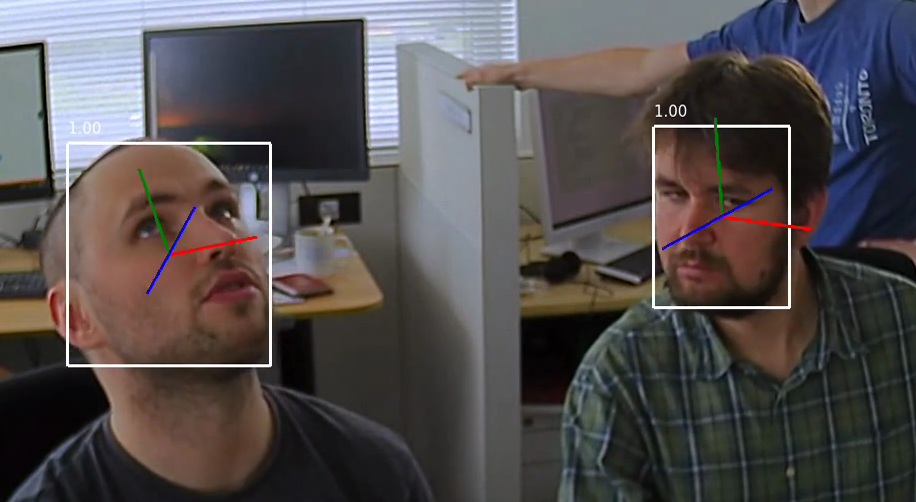face-detection-retail-0044¶
Use Case and High-Level Description¶
Face detector based on SqueezeNet light (half-channels) as a backbone with a single SSD for indoor/outdoor scenes shot by a front-facing camera. The backbone consists of fire modules to reduce the number of computations. The single SSD head from 1/16 scale feature map has nine clustered prior boxes.
Example¶

Specification¶
Metric |
Value |
|---|---|
AP (WIDER) |
83.00% |
GFlops |
1.067 |
MParams |
0.588 |
Source framework |
Caffe* |
Average Precision (AP) is defined as an area under the precision/recall curve. All numbers were evaluated by taking into account only faces bigger than 60 x 60 pixels.
Inputs¶
Original Model¶
Image, name: input, shape: 1, 3, 300, 300, format B, C, H, W, where:
B- batch sizeC- number of channelsH- image heightW- image width
Expected color order: BGR.
Converted Model¶
Image, name: input, shape: 1, 3, 300, 300, format B, C, H, W, where:
B- batch sizeC- number of channelsH- image heightW- image width
Expected color order: BGR.
Outputs¶
Original Model¶
The net outputs a blob with shape: 1, 1, 200, 7 in the format 1, 1, N, 7, where N is the number of detected
bounding boxes. For each detection, the description has the format:
[image_id, label, conf, x_min, y_min, x_max, y_max], where:
image_id- ID of the image in the batchlabel- predicted class IDconf- confidence for the predicted class(
x_min,y_min) - coordinates of the top left bounding box corner(
x_max,y_max) - coordinates of the bottom right bounding box corner.
Converted Model¶
The net outputs a blob with shape: 1, 1, 200, 7 in the format 1, 1, N, 7, where N is the number of detected
bounding boxes. For each detection, the description has the format:
[image_id, label, conf, x_min, y_min, x_max, y_max], where:
image_id- ID of the image in the batchlabel- predicted class IDconf- confidence for the predicted class(
x_min,y_min) - coordinates of the top left bounding box corner(
x_max,y_max) - coordinates of the bottom right bounding box corner.
Download a Model and Convert it into OpenVINO™ IR Format¶
You can download models and if necessary convert them into OpenVINO™ IR format using the Model Downloader and other automation tools as shown in the examples below.
An example of using the Model Downloader:
omz_downloader --name <model_name>
An example of using the Model Converter:
omz_converter --name <model_name>
Demo usage¶
The model can be used in the following demos provided by the Open Model Zoo to show its capabilities:
Legal Information¶
The original model is distributed under the
Apache License, Version 2.0.
A copy of the license is provided in <omz_dir>/models/public/licenses/APACHE-2.0.txt.
[*] Other names and brands may be claimed as the property of others.